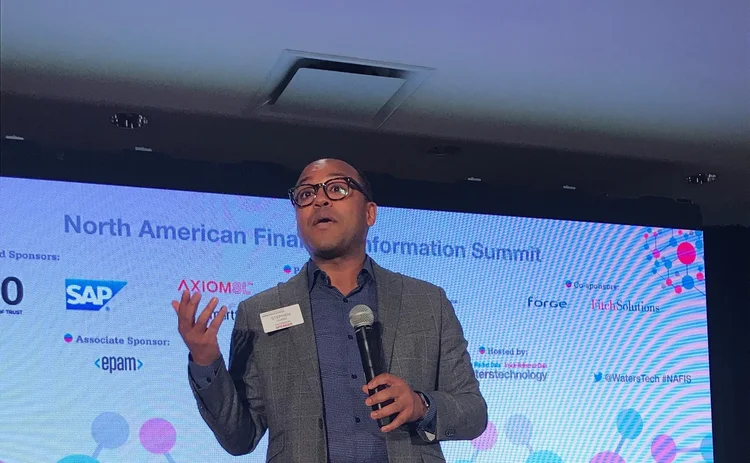Facebook Data Chief: Data Drives Convergence and Opportunity
At the WatersTechnology North American Financial information Summit, Facebook’s Stephen Harris said data can help in identifying and understanding convergence opportunities.

Harris is not a stranger to the space—before joining Facebook, he spent several years as head of enterprise data at Wells Fargo, where he regularly sat down with regulators to explain the bank’s target data architecture.
“It was a very complex ecosystem,” Harris told delegates during his keynote address at the North American Financial Information Summit (Nafis). “I think one of the biggest eye-opening moments, living through that design process was … I struggled with watching companies like Facebook and Google and other market movers transform their operations, but then I would sit back and say, ‘Why is this so hard for Wells? Why is this so hard for financial services? Why is it so challenging for us to create a single report that’s verifiable and that the regulators would automatically sign off on?’”
Harris acknowledged that regulation is still a big burden in financial services, but one that good data can ease.
“When the data is inaccurate or incomplete, then the rise of regulation occurs,” he said. “I think in some spaces it’s absolutely relevant and required, but I think that also balancing that so we don’t disrupt continued innovation and growth and meeting the needs of the globe is also important. So it’s driving the evolution of new business models. It’ll be interesting to see five years from now what new business models have evolved from financial services. Not just a new product taken to market, but what is the actual new business model?”
In order for that to happen, the industry may need to revisit the roots of data management.
“Part of trying to understand how these opportunities evolve is leaning back on the classics—data and data management, the ability to understand and interpret the data. It’s going to give insights into business operations, products, product enhancements, and potentially going to drive innovation. Personally, I think you should lean in that direction, of driving innovation by deriving insights, but for the purpose of what? I think that’s really part of the conversation today,” he said.
Part of the reason for a back-to-basics approach is to ensure responsible management of the sheer volumes of data generated in a day: 125 million hours of streaming over the Netflix platform, 6.6 billion internet searches, 269 billion emails sent, according to Harris.
“I’ve been around the block a bit and I’ve lived through this convergence or transformation from a data and technology perspective, and it still baffles my mind that we have technology platforms that are processing and exposing these volumes of content across multiple platforms and we are the daily consumers of it,” he said. “How do we position ourselves to take full advantage of what is happening around us with respect to data and insights?”
When talking about data, Harris said he wonders why it is so difficult to have a fact-based conversation. “Every company where data exists—which is every company—you’re going to have challenges with that data,” he said. “It’s going to be tough to navigate.”
Regardless, Harris said data-driven convergence influences the industry, and informs product development, needs and requirements, and will continue to do so. Key examples are how Amazon has revolutionized the retail space, and Uber and Airbnb redefined transportation and travel booking. Harris said Uber isn’t finished changing the game and predicted that Uber will create “another ‘Kodak moment’ for major transportation players that are out there today like UPS and FedEx. You can start to see how these industries are evolving and changing, and at the core of it all is data.”
Harris said the industry is poised for its next big innovation. “What’s going to be the new thing that comes out of financial services as a result of people sitting in a room, analyzing the data, and allowing it to inform both the business strategy, the operations of the organization and using that as leverage?” he said. “Each business under the umbrella of Amazon has spawned out of them pausing—not slowing down—to think about the needs in the market, what customers are asking for that they think they need, and what customers are not asking for that our data tells us they need.”
Harris said data creates a “new dynamic” and that there are rapid shifts occurring within natural business frameworks. “[We have the] ability to understand the history behind those frameworks, the purpose it serves, and the matriculation that you need to make as you pivot to take on what I would call the ‘net new.’ That net new is sitting at the center called data. So people process technology, today; people follow the process; people leverage the technology; and the technology enables the process. What happens with the data? It crosses all three and the message there is ensuring that you are leveraging data and insights in each one of those as your business model evolves,” he said. “We want to be in a place where we actually are surrounding our daily activity, our daily process, our daily engagement, with systems of insight, because that’s where we get the value.”
Only users who have a paid subscription or are part of a corporate subscription are able to print or copy content.
To access these options, along with all other subscription benefits, please contact info@waterstechnology.com or view our subscription options here: http://subscriptions.waterstechnology.com/subscribe
You are currently unable to print this content. Please contact info@waterstechnology.com to find out more.
You are currently unable to copy this content. Please contact info@waterstechnology.com to find out more.
Copyright Infopro Digital Limited. All rights reserved.
As outlined in our terms and conditions, https://www.infopro-digital.com/terms-and-conditions/subscriptions/ (point 2.4), printing is limited to a single copy.
If you would like to purchase additional rights please email info@waterstechnology.com
Copyright Infopro Digital Limited. All rights reserved.
You may share this content using our article tools. As outlined in our terms and conditions, https://www.infopro-digital.com/terms-and-conditions/subscriptions/ (clause 2.4), an Authorised User may only make one copy of the materials for their own personal use. You must also comply with the restrictions in clause 2.5.
If you would like to purchase additional rights please email info@waterstechnology.com
More on Data Management
New working group to create open framework for managing rising market data costs
Substantive Research is putting together a working group of market data-consuming firms with the aim of crafting quantitative metrics for market data cost avoidance.
Off-channel messaging (and regulators) still a massive headache for banks
Waters Wrap: Anthony wonders why US regulators are waging a war using fines, while European regulators have chosen a less draconian path.
Back to basics: Data management woes continue for the buy side
Data management platform Fencore helps investment managers resolve symptoms of not having a central data layer.
‘Feature, not a bug’: Bloomberg makes the case for Figi
Bloomberg created the Figi identifier, but ceded all its rights to the Object Management Group 10 years ago. Here, Bloomberg’s Richard Robinson and Steve Meizanis write to dispel what they believe to be misconceptions about Figi and the FDTA.
SS&C builds data mesh to unite acquired platforms
The vendor is using GenAI and APIs as part of the ongoing project.
Aussie asset managers struggle to meet ‘bank-like’ collateral, margin obligations
New margin and collateral requirements imposed by UMR and its regulator, Apra, are forcing buy-side firms to find tools to help.
Where have all the exchange platform providers gone?
The IMD Wrap: Running an exchange is a profitable business. The margins on market data sales alone can be staggering. And since every exchange needs a reliable and efficient exchange technology stack, Max asks why more vendors aren’t diving into this space.
Reading the bones: Citi, BNY, Morgan Stanley invest in AI, alt data, & private markets
Investment arms at large US banks are taken with emerging technologies such as generative AI, alternative and unstructured data, and private markets as they look to partner with, acquire, and invest in leading startups.








